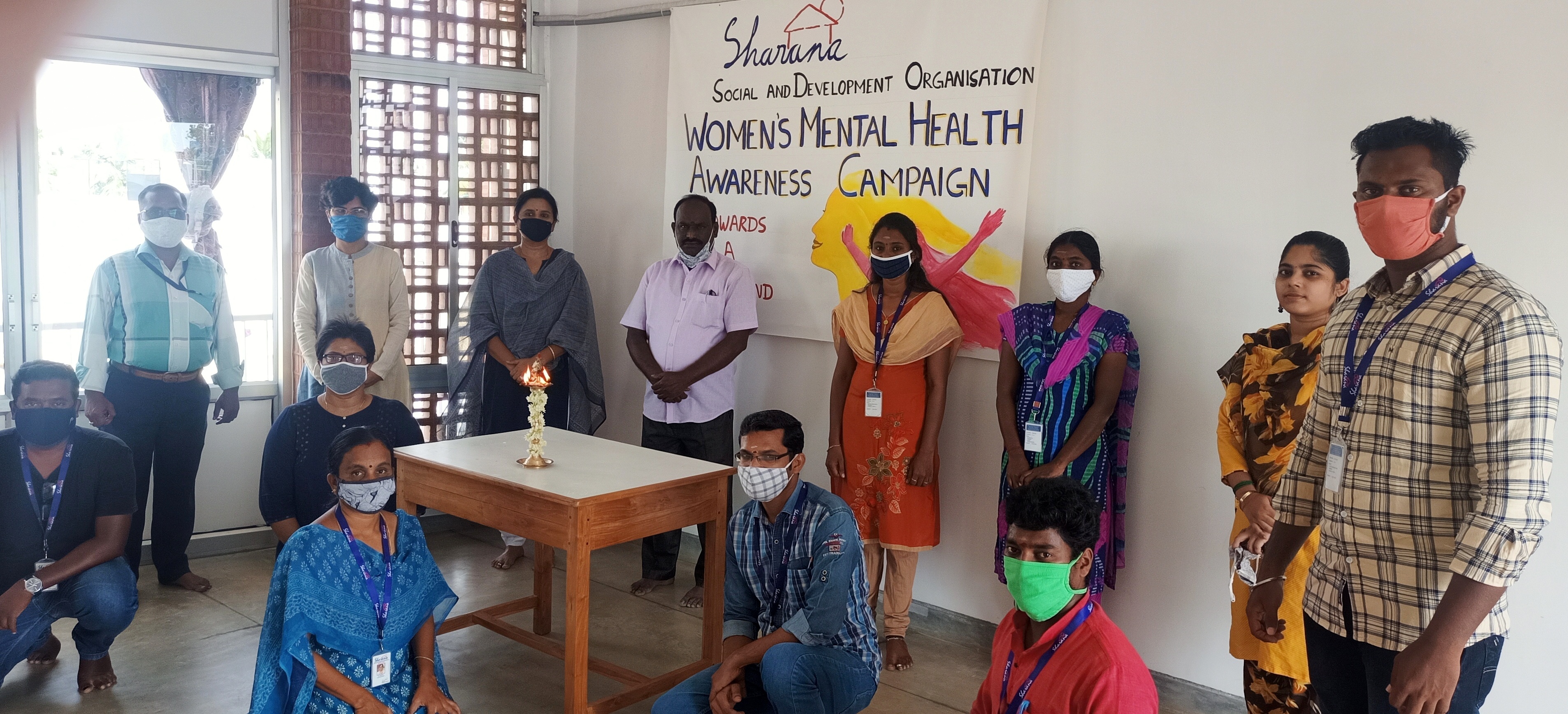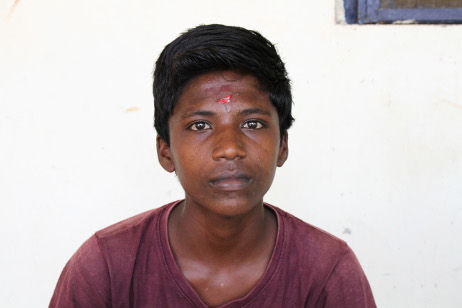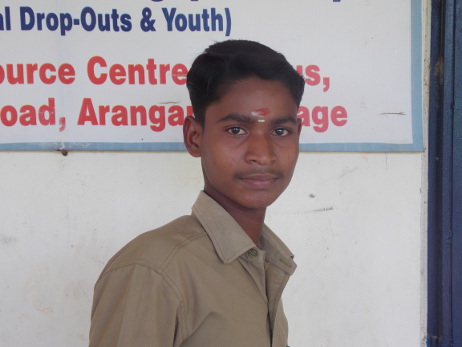- Report by:- Jagriti Shankar and Vandana Shah
Sharana conducted a “Women’s Mental Health Awareness Campaign: Towards a Sound Mind” for the beneficiaries of Women’s Social Entrepreneurship project from the 19th to the 25th of August, 2020. This project is supported by Majany, Luxembourg.
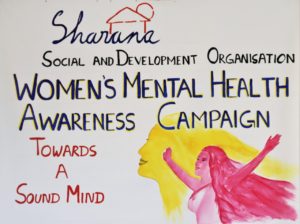
The project works towards economic empowerment of women and supports women in establishing their own small business or to upscale their existing business by providing financial support as well as guidance on business development, including capacity building. During the past few months since the outbreak of the Covid pandemic, most economic activities have taken a hit all over the world and Sharana’s beneficiaries are also in a similar situation. Multiple lockdowns and the resultant closure of businesses have also had an adverse impact on the household economy, and within the entire economic spectrum the poor have faced the biggest brunt. Since women have the primary responsibility of food & nutrition, as well as child-elderly-sick care in the households, they have been disproportionately affected by the pandemic.
Sharana has been working proactively towards the wellbeing of the beneficiaries since the beginning of the pandemic in different ways, by spreading awareness about the pandemic, by informing communities about the safe practices, by distributing relief materials, masks & art kits, and by distributing cooked meals, as well as by providing a listening ear to the women when there is no one else they can speak to. Since the beginning of the pandemic Sharana’s social workers have been making regular follow-up calls with the beneficiaries over the phone and giving advice about keeping safe, maintaining protocols, etc.
At one point we felt that there was also a need to address and support mental and emotional health along with supporting food & nutrition. In these distressing times the women were getting anxious with so many ‘tensions’ and it had started to take a toll on their mental as well as physical health. The idea of this campaign came during one of the meetings with social workers when the social workers were discussing that they were overwhelmed by listening to the day-to-day challenges of the beneficiaries.
Methodology
It was a 5-day tele-campaign and was run from Sharana’s social centre in Pondicherry. Sharana’s counsellor Mr Prakash held individual counselling sessions with the beneficiaries over the phone calls. All beneficiaries were informed in advance about the campaign and about the over-call counselling session. They were also advised that for an effective counselling session they should ensure that they can speak to the counsellor without disturbance. Beneficiaries were assured that all calls will be 100% confidential, and their personal information will not be shared with anyone, and hence this report is presenting only the analysis of the trends that have been found out during the campaign and by no means Sharana is disclosing the identity of any individual, or their mental health conditions.
Sharana’s Child Protection Officer Mr. Manuel was also appointed to attend all the calls, to address any potential child abuse cases. He also gave useful suggestions in cases where unusual adolescent children’s behaviour was observed or when some of the mothers were overly stressed about their children’s safety, education or well-being.
This is also to note that this report discusses only the trends that have been observed during the campaign run by Sharana, with the beneficiaries of its Women’s Social Entrepreneurship Programme, and do not necessarily apply to all women in general.
Women’s Mental Health and the Stress factors
The analysis of the campaign data shows us that there are a lot of different stress factors troubling women since the first lockdown which started on March 24th. While loss of income due to Covid-19 came out to be by and large the Number 1 stress factor for women, other stressors included increased expenditure, increased workload, missed school days/formal education for children, worries about children falling in wrong company, and missing normal life, etc.
Many respondents shared that in order to stay up to date about the development regarding Covid-19, they keep watching television, but the more they watch television, the more stressed they are. One woman shared, “The TV is on all day, I listen to news and I start to worry about my family’s safety and our future. In this situation even if I want to stay positive I cannot.”

Loss of Income and Increasing Debt
The main factor and a very obvious reason causing mental stress to women, men and families, was the loss of work and income during Covid-19 pandemic. For most of the beneficiaries their income had stopped due to the closure or reduction in the economic activities.
Over 31% of women said that their income was reduced almost by 75%, and for 14% of women entrepreneurs the income was down to 0 as they were not able to open their shops. While 20% of husbands have totally lost their work, and for about 39% the income has been reduced up to 75%. In some cases men’s work was more affected as they work as daily labourers such as, masons,and plumbers at construction sites and construction work had totally stopped for a few months. While there are many whose jobs have not been restored even after the lockdown has been lifted; many women shared that they are building up their businesses from scratch post lockdown.
The loss of income has put the families under great financial pressure, as most of the beneficiaries depend on this daily income for their livelihood. The reduction in income has led to increasing debts, and mental stress for the families. About 63% of women said that they were worried that their debt has been increasing ever since the corona lockdown had started. They have been taking loans from private money lenders, self-help groups, neighbours and relatives, etc. While some were taking loans to manage their day-to-day expenses of food and utilities, some also took loans to repay the EMIs of other outstanding loans(often with very high interest rates), and thus the vicious cycle of debt gets set into place.
The first thing women worried about when their income depleted was how to continue to feed the children. Every second woman said that providing food for her children was her major concern.
About 79% of the women beneficiaries said that on one hand their income has reduced and on the other hand, their household expenditure and in particular the spending on food has increased because the children are at home all the time.
 Few families whose children attend online classes run by schools have reported that they had to buy a smartphone in order for their child to join the class which was a big expense for them during this critical time, and on top of it the regular internet expense is an additional cost which they now have to bear. However these were only a few families, because for most, their children study in government schools, where no form of formal education had started since March.
Few families whose children attend online classes run by schools have reported that they had to buy a smartphone in order for their child to join the class which was a big expense for them during this critical time, and on top of it the regular internet expense is an additional cost which they now have to bear. However these were only a few families, because for most, their children study in government schools, where no form of formal education had started since March.
One woman who sells traditional snacks said, “Since my husband and daughter lost their jobs, and I also could not earn much, I started to use my savings which I had kept for my children’s future.” Many women reported that the small savings they were able to put together before Covid struck, helped them go through tough economic times in the last 5 months.
Increased Workload
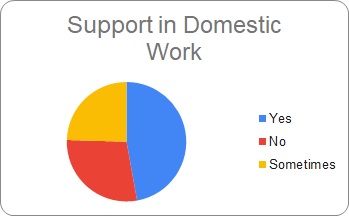 Almost all women said that their workload had increased because the family members were at home all the time, and that meant additional household work, more cooking, and additional hours of children, sick and elderly care, and as all of these tasks are predominantly women’s work, the workload of women has increased multifold. About 52% of women said their workload had increased as opposed to 44% of women who reported that the work was the same as before. Most women shared that they have had no rest days which added to their mental stress. While it is normal for women to do the majority of the household chores, and have almost no rest days, Corona-time has been esp. stressful with the increased workload and additional difficulties that came with it.
Almost all women said that their workload had increased because the family members were at home all the time, and that meant additional household work, more cooking, and additional hours of children, sick and elderly care, and as all of these tasks are predominantly women’s work, the workload of women has increased multifold. About 52% of women said their workload had increased as opposed to 44% of women who reported that the work was the same as before. Most women shared that they have had no rest days which added to their mental stress. While it is normal for women to do the majority of the household chores, and have almost no rest days, Corona-time has been esp. stressful with the increased workload and additional difficulties that came with it.
On top of it only 47.2% of women said that their husbands or other family members were helping them with household chores. Most women who got the support shared that their daughters were helping them out with small chores like folding clothes, fixing utensils, sweeping the house, etc., which gives an indication that the Covid-19 pandemic has reinforced the gender distribution of unpaid domestic work, while all the members of the family stayed at home, mostly it was girls who got the responsibility of added domestic work.
One respondent shared, “Our daughters are helping out in household chores like drying out the laundry, filling up water and washing vessels. The boys only sometimes help in small outside work.”
This finding during the mental health campaign has given us an important lead to work towards the pressing issue of stereotypical gender roles and responsibilities and unequal domestic work distribution between boys and girls in our society. At Sharana we have already started planning to address this issue through our Seeds of Change program.
Physical Health and Food Intake
There is a direct relation between a healthy body and a healthy mind. Although not many complained of any aggravated physical illnesses as such, about 44% of women said that they were not eating properly and their food intake had reduced during the time they stayed at home without work and income. Some said that they are purposely eating less food as there is no regular income now. One respondent said,”I feel body pain but I continue to work, because work has to be done, and food has to be cooked for children.” Another respondent stated, “Due to less income I am not able to eat properly, I sacrifice my food so my children can eat”. Some others stated that due to increased load of domestic work their meal timings have become irregular and most of the days they skip their breakfast.
This is a regular practice in most families even in non-Corona- that women always eat last and eat least and the larger/healthier part of the cooked meal goes to the husband and children. The data shows that Corona has further taken this divide to the next level- that almost 1 in 3 women are not eating sufficiently could mean that many of these women could be at the serious risk of nutrition-related long-term illnesses and health problems if not addressed immediately.

Worries for Children
Most of the women had some or the other worry for their children. One respondent said, “I live in constant fear for my family’s safety and worry about their future. I worry that they will be affected by Corona.”
Children’s education was the number one worry of the mothers’ for their children. Most children of our women entrepreneurs attend government schools which remain closed till date with the Covid cases rising every day. Most of the women were anxious about the loss of school days and missed structured education provided in conventional schooling.
Covid-19 had struck at a crucial time of the academic year when the studies at school were at the peak, and students were preparing for their final exams. Although the closure of schools have not affected children’s grades because the government has given relaxation and have promoted all students to the next grade level, nonetheless parents are worried about the missed education for their children. While some were worried that with this long gap children might forget what they were learning at school, and another woman expressed her helplessness as, “I worry because I’m not able to teach my children at home as I myself am not much educated.”
 In addition, in the advent of online learning, while many schools have shifted to the online classes, there are many who are not able to shift to the online mode of education delivery for reasons like lack of skills, or lack of resources and facilities. In some cases, while schools had started the online classes, families did not have resources like smartphones or tablets to attend the online classes.
In addition, in the advent of online learning, while many schools have shifted to the online classes, there are many who are not able to shift to the online mode of education delivery for reasons like lack of skills, or lack of resources and facilities. In some cases, while schools had started the online classes, families did not have resources like smartphones or tablets to attend the online classes.
Arranging food for children was women’s second most worried factor. They were tense that children are not eating enough nutritious and balanced food that they were eating earlier, due to the closure of Sharana’s creche and mid-day meals at schools. Women were also worried that the children were not safe at home; and could get into bad habits and poor company; they were also concerned about possible abuse. Some women were apprehensive that children may lose interest in education; and that they may opt to go for work instead either of their own will or due to the family economic situation. Many felt helpless as they were not able to help the children with continuing their education; being uneducated themselves.
Relationships, Violence, Abuse and Alcohol Consumption
Amidst all the tensions, there was a silver lining about the reduction in alcohol consumption and which resulted in men spending quality time with their families. Contrary to general trends our women who were in command of their contribution to the family in tough times saw increased cooperation from their husbands rather than increased domestic abuse.
A few of the Women Entrepreneurs shared that their husbands exhibited signs of anger and aggression due to non-availability of alcohol, while many shared that they spent more quality time with the children because they weren’t inebriated. About 10% of beneficiaries reported the incidents of domestic abuse and hitting by husbands, which according to them had reduced during the lockdown as alcohol consumption had reduced. One beneficiary noted, “Only when used to drink he would hit me sometimes, but now he is not drinking so he has become better”. Another woman said she was happy that her husband was not drinking alcohol, “Due to lockdown he did not drink alcohol and although we earned a small amount of money, we were happy.”
At the same time most of our Women Social Entrepreneurs have reported increased autonomy in household decision making since they began their own business. Our social workers have been reporting that the women’s confidence levels have also increased and they feel socially and economically empowered. This clearly reconfirms that economic empowerment is a driving force for reducing violence and abuse against women. When most of the husbands had lost their jobs during the corona lockdown, at those times the women’s income was the primary and the only source of income for the family which further enhanced their position in the households. Most women share feeling more confident as well as respected by their families and the community- they experienced an increased social status.
On a question about living together for so long with family, one woman shared, “Understanding has increased between my husband, my children and myself, now they understand my difficulties.”
To address the domestic abuse issue, Sharana is planning to provide follow-up counselling to the cases which reported the incidents of abuse. We will also continue to provide emergency help-line numbers of the police that the women can call for emergency support. In the coming months we are also planning to work alongside the Govt and other organisations to create awareness of women’s rights and the issue of domestic and alcohol abuse within the communities we work with- we will with the help of the women refer husbands/fathers in need of support and intervention to these organisations. These interventions will allow the fathers eventually to be more involved in the family, and be economically as well as emotionally invested.
Coping with Stress
 On the question of how women were coping with their stress, many women said that they could not share their worries with anyone; however they also shared that when they shared their troubles with the counsellor/Sharana social worker they immediately felt lighter.
On the question of how women were coping with their stress, many women said that they could not share their worries with anyone; however they also shared that when they shared their troubles with the counsellor/Sharana social worker they immediately felt lighter.
They were also not able to go to their parents’ house and were missing the normal days to return so that they could visit friends and relatives. Some women were able to share a few things with their husbands, while most reported crying out their woes alone at home. This is true also for non-Corona times, most women do not always have a large network of support, both physical and mental. However, they derive strength from sharing their problems with other women, neighbours, friends and extended family. This they were not able to during the lockdown, due to fear of infection and unavailability of transport. Also since women have house-work to do for most of the day, and are not expected to come out/be out of the home in the evenings/night; the lockdown has increased their level of stress and frustration since sharing had stopped.
Helpline numbers for child related emergencies,and domestic worries were shared with the women during the counselling calls in case of any situation that went out of hand
Many said that they did nothing specific to address their stress, and an equal number i.e. about 38% of women said that spending time with their children was stress relieving for them. Many women also reported that they went to temples to find peace once the temples were reopened for the public. One respondent said, “I visit the temple and offer my worries to God. God helps me accept certain difficulties and I get strength.”

Sharing their worries with their mothers, friends and husbands was consoling for some, some beneficiaries also shared that in the past 4 months with Corona; the only people they could share their problems without judgement or shame were Sharana’s Social Workers. Their motivation and presence gave the women courage and strength to continue moving ahead.
Sharana’s Support
On the question of what the beneficiaries think of the relief provided by Sharana, the beneficiaries responded that the relief in terms of household provisions, hygiene kits, activity kits etc. came at the right time and were useful for them. One woman shared, “The provision relief helped the family to have food during no income days”. The other said, “The activity kit given during lockdown time was very useful and children are using it to make drawings. I also use it sometimes.”
Sharana has also given relaxation in the repayment of EMIs for its Social Entrepreneurship Beneficiaries since April 2020, and beneficiaries have been availing the relaxation as per their economic situations. While some women who have started earning, have started to repay the EMIs, some are still availing the facility of delayed or postponed EMIs.
Conclusion
There is a lot of built up stress and anxiety our women beneficiaries are experiencing every day, from the fear of Corona to what the future holds, from the worries of children’s health and education to the increase in workload and decrease in income. For most women, this counselling call had turned out to be the first such opportunity they had got to share what they have been going through during Covid19 pandemic. While some women sought solutions, others simply needed a trustworthy listening ear.
Our counsellor suggested tools of self-care, of keeping the stress levels in check and promoting mental well-being to the beneficiaries. He gave appropriate suggestions on a case by case basis that could help women in relieving stresses and worries they are going through. While some were suggested to take time out for self-care, listening to soothing music, and watching less sensational television, other suggestions were about sharing the problems with the people they trust, keep a schedule to exercise, etc. In a few of the critical cases the counsellor has made note and will be following up the cases after the campaign as well.
The campaign has also been helpful to Sharana as it gave important insights about what it is that our beneficiaries are going through and how their lives and priorities have changed during the pandemic. At Sharana we have already begun the planning to design new programs and activities in order to address the changing requirements of the beneficiaries. The Women’s Social Entrepreneurship Program will devise a new strategy to support the businesses of women beneficiaries. To address women’s worries about children’s education, Sharana has decided to start a program of Digital Education for the children studying in govt schools to facilitate free access and provide education through digital content to the children.
For the adolescents we are going to revive our Vocational Training program so that these young adults can acquire career oriented skills. Sharana is very particular about providing equal opportunities to boys and girls in all our programs, be it vocational training for adolescents or digital education for younger children. On top of it, to carry forward our agenda of gender equality we are also planning to initiate activities with our Seeds of Change program. The ongoing Art and Sports program(Seeds of Change) will also allow the children to be both physically and emotionally positively engaged, we will also explore possibilities to engage women in this program in the coming months.
And thus, Sharana’s “Women’s Mental Health Awareness Campaign: Towards a Sound Mind” came to an end with – 5 days of Campaign, 50+ Women reached, 30+ Hours of Counselling sessions
As a learning organization Sharana is always welcoming new ideas and strategic partnership with other organizations and individuals. Should you like to collaborate with us kindly contact at 